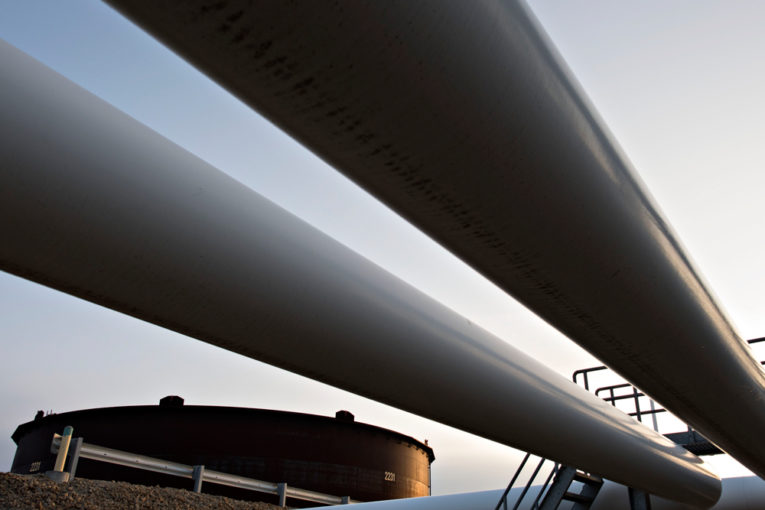
CALGARY – The Canadian Energy Regulator is set to make a decision by end of day Friday that will affect the future of the spot market for domestic oil — and could also have major implications for both Enbridge Inc. and the country’s largest oil producers.
The Canadian Energy Regulator sent Calgary-based pipeline giant Enbridge Inc. an email on Sept. 24, which the Financial Post has seen, advising that a decision about a complaint made against the company would be released by the end of the week.
“The decision and timing of the release rests with the Commission, but this email is provided for convenience of parties recognizing the current circumstances,” the email noted. The Post has confirmed the authenticity of the email.
The decision is hotly anticipated as more than 30 companies made filings either for or against Enbridge in recent weeks. It will also settle a fracas that broke out in the oilpatch in August, when Enbridge launched an open season to call for the signing of long-term contracts on its Mainline pipeline network, which is a network of oil pipelines that move 2.85 million barrels of oil per day out of Western Canada to the U.S. Midwest and Central Canada.
The entirety of the system is currently available for spot-market shipments but Enbridge is calling for contracts on 90 per cent of the system — effectively inverting the amount of space available to the spot market at a time when all pipelines out of Canada are full and new pipeline projects have been delayed.
Shortly after the open season was announced, three companies – Canadian Natural Resources Ltd., Suncor Energy Inc. and Shell Canada Ltd. – as well as industry group Explorers and Producers Association of Canada lodged complaints about the contracts with the CER.
In CNRL’s case, the company attempted to highlight the magnitude of the financial commitment domestic oil producers are being asked to make.
“If Canadian Natural were to commit all of its production to the Mainline, the financial commitment would range from $21 billion for eight-year commitments to $53 billion for 20-year commitments,” the company wrote Sept. 13 in response to an Enbridge submission.
It is highly unlikely that CNRL, Canada’s largest oil and gas company by volume, would attempt to ship all its oil on the Mainline because it has made other commitments, including to the Trans Mountain Expansion project.
Each of those four complainants have asked the CER to delay Enbridge’s contracting of the Mainline and called it an “abuse of market power” because companies are currently desperate for pipeline space.
“Companies are making billions of dollars of commitments here and that’s a serious concern for many,” ARC Energy Research Institute senior director Jackie Forrest said.
Companies are making billions of dollars of commitments here and that’s a serious concern for many
Jackie Forrest, senior director, ARC Energy Research Institute
She also noted how tight the deadlines are between the time the CER makes its decision this week and when companies need to sign contracts to secure pipeline space. The open season is set to close on Oct. 2. “To have so little notice is a concern,” she said.
Since the initial four complaints were lodged in late August, 24 domestic oil companies have expressed their opposition to Enbridge’s plans and filed letters supporting the complainants. The government of Saskatchewan is also siding with the complainants against Enbridge.
The issue has divided the local energy sector.
On the other side of the issue, Cenovus Energy Inc. and Imperial Oil Ltd. announced their support for Enbridge’s open season process in addition to a number of U.S.-based refining companies including United Refining Co., Houston Refining LP and Marathon Petroleum Trading Canada LLC.
Enbridge has argued throughout the process that an open season is a market-based process and the CER has never interfered in a market process. Those who wish to complain about the terms of the open season should do so when Enbridge applies to the CER to approve the contracts, the company said.
“We believe that the open season is entirely consistent with the well-established practice of ensuring commercial support before seeking regulatory approval, a view that is shared by a range of customers,” Enbridge said in an emailed statement.
Analysts say the pipeline giant would gain from a successful open season because the volumes on its Mainline would remain consistent even if competing pipelines such as the Trans Mountain expansion and TC Energy Corp.’s Keystone XL are built.
“It would be beneficial in terms of ensuring the volumes remain strong,” DBRS managing director, energy Michael Rao said of Enbridge’s motivation to contract the network.
However, the company, which has $60 billion of long-term debt, would not likely see a hit to its credit rating if the contracts are not signed. “It’s not that if they don’t get (the contracts), it would have a negative impact,” Rao said.
• Email: [email protected] | Twitter: geoffreymorgan
You can read more of the news on source
